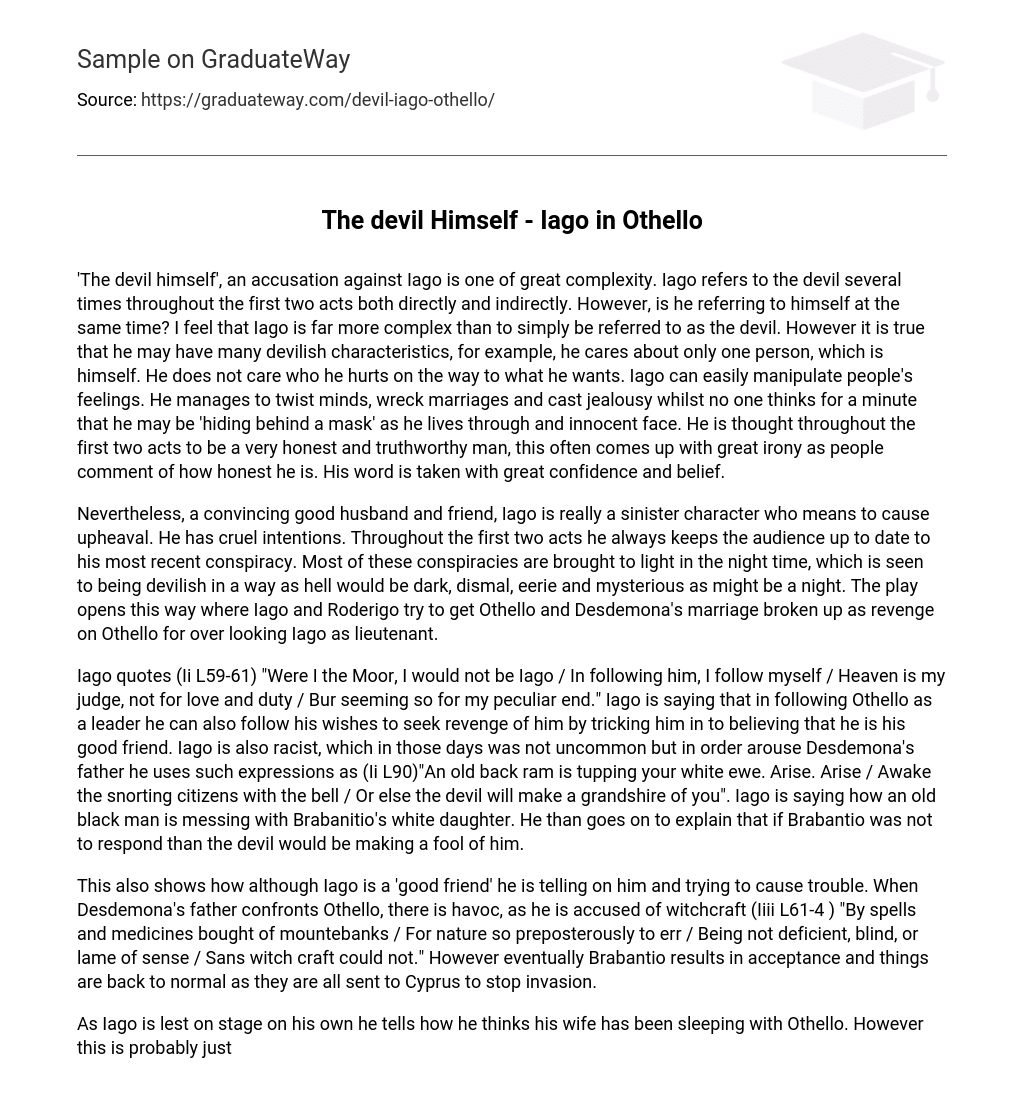‘The devil himself’, an accusation against Iago, is a complex portrayal. Iago directly and indirectly refers to the devil multiple times in the first two acts. However, it is unclear whether he sees himself as the devil. I believe that Iago’s character goes beyond being simply labeled as the devil. Nonetheless, it is true that he exhibits many devilish traits. He is self-centered and unconcerned about hurting others to achieve his desires. Iago easily manipulates people’s emotions, causing chaos in relationships and fueling jealousy, all while concealing his true intentions behind a seemingly innocent facade. Throughout the first two acts, Iago is perceived as an honest and trustworthy man, which adds to the irony when people praise his honesty. His words are unquestionably accepted and believed.
Despite appearing to be a convincing good husband and friend, Iago is actually a sinister character who intends to cause chaos. He consistently reveals his malicious intentions to the audience throughout the first two acts of the play. These deceptions mostly occur at night, symbolizing their evil nature, as darkness is associated with hellish and mysterious qualities. The play begins with Iago and Roderigo plotting to ruin Othello and Desdemona’s marriage in revenge for Othello promoting someone else as lieutenant instead of Iago.
Iago quotes (Ii L59-61) “Were I the Moor, I would not be Iago / In following him, I follow myself / Heaven is my judge, not for love and duty / Bur seeming so for my peculiar end.” In these lines, Iago expresses that if he were in Othello’s position, he would exact revenge by pretending to be his loyal friend. It is worth noting that Iago is also racist, a common belief in those times. To incite Brabantio’s anger, he uses derogatory remarks like (Ii L90) “An old back ram is tupping your white ewe. Arise. Arise / Awake the snorting citizens with the bell / Or else the devil will make a grandshire of you”. Here, Iago refers to an older black man engaging in a sexual relationship with Brabantio’s white daughter. Additionally, he warns Brabantio that if he doesn’t respond, the devil will mock him.
The passage illustrates that Iago, despite being considered a ‘good friend,’ betrays Othello and seeks to create chaos. When Desdemona’s father confronts Othello, it leads to turmoil as he accuses Othello of practicing witchcraft (Iiii L61-4) “By spells and medicines bought of mountebanks / For nature so preposterously to err / Being not deficient, blind, or lame of sense / Sans witch craft could not.” Nonetheless, Brabantio eventually accepts the truth and things return to normal as they are all sent to Cyprus to prevent an invasion.
Iago, left alone on stage, expresses his belief that his wife has been having an affair with Othello. However, this accusation may just be an excuse for him to harbor hatred towards Othello. He then mentions hell once more (Iiii L385-6), stating “I have’t. it is engendered. Hell and night / Must bring this monstrous birth to the world’s light.” Here, he suggests that the night and hell will bring his scheme to fruition. Additionally, he reveals his plan to eliminate both Cassio and Desdemona, take Cassio’s position, and have Othello all to himself. This illustrates Iago’s selfish nature, as he desires Othello exclusively for himself.
In Cyprus, Iago is determined to create tension between Othello and Desdemona out of spite. Iago proceeds to inform Roderigo about Desdemona’s love for Cassio, suggesting that she is bored and in need of a younger man. Iago reveals that Cassio also desires Desdemona and encourages Roderigo to provoke a conflict with Cassio, aiming to cause him trouble. Furthermore, Iago reveals that he is using Roderigo due to his past affair with Iago’s wife. Iago then attempts to manipulate Cassio into confessing his love for Desdemona.
Iago orchestrates the intoxication of Cassio, leading him into a conflict initiated by Roderigo. In his drunken state, Cassio directs his anger towards Montano, the governor of Cyprus. The sound of a warning bell awakens Othello, who becomes furious and dismisses Cassio from his position as lieutenant. Iago plans to falsely inform Othello about an alleged affair between Desdemona and Cassio. Reflecting on his devious actions, Iago compares himself to a devil, but emphasizes that there is more to him than meets the eye (IIIiii L317-9) “Directly to his good? Divinity of hell! / When devils will blackest sins put on / They do suggest at first with heavenly shows / As I do now.”





